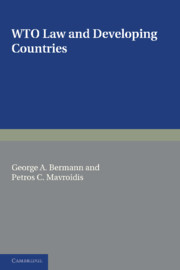Book contents
- Frontmatter
- Contents
- Contributors
- Developing Countries in the WTO System
- 1 The Legal Status of Special and Differential Treatment Provisions under the WTO Agreements
- 2 Trade Preferences to Small Developing Countries and the Welfare Costs of Lost Multilateral Liberalization
- 3 China in the WTO 2006: “Law and Its Limitations” in the Context of TRIPS
- 4 Developing Countries in the WTO Services Negotiations: Doing Enough?
- 5 Developing Countries and the Protection of Intellectual Property Rights: Current Issues in the WTO
- 6 Participation of Developing Countries in the WTO – New Evidence Based on the 2003 Official Records
- 7 Developing Countries and GATT/WTO Dispute Settlement
- 8 Representing Developing Countries in WTO Dispute Settlement Proceedings
- 9 Compensation and Retaliation: A Developing Country's Perspective
- 10 A Preference for Development: The Law and Economics of GSP
- 11 The GSP Fallacy: A Critique of the Appellate Body's Ruling in the GSP Case on Legal, Economic, and Political/Systemic Grounds
- 12 Is the WTO Doing Enough for Developing Countries?
- Index
7 - Developing Countries and GATT/WTO Dispute Settlement
Published online by Cambridge University Press: 04 August 2010
- Frontmatter
- Contents
- Contributors
- Developing Countries in the WTO System
- 1 The Legal Status of Special and Differential Treatment Provisions under the WTO Agreements
- 2 Trade Preferences to Small Developing Countries and the Welfare Costs of Lost Multilateral Liberalization
- 3 China in the WTO 2006: “Law and Its Limitations” in the Context of TRIPS
- 4 Developing Countries in the WTO Services Negotiations: Doing Enough?
- 5 Developing Countries and the Protection of Intellectual Property Rights: Current Issues in the WTO
- 6 Participation of Developing Countries in the WTO – New Evidence Based on the 2003 Official Records
- 7 Developing Countries and GATT/WTO Dispute Settlement
- 8 Representing Developing Countries in WTO Dispute Settlement Proceedings
- 9 Compensation and Retaliation: A Developing Country's Perspective
- 10 A Preference for Development: The Law and Economics of GSP
- 11 The GSP Fallacy: A Critique of the Appellate Body's Ruling in the GSP Case on Legal, Economic, and Political/Systemic Grounds
- 12 Is the WTO Doing Enough for Developing Countries?
- Index
Summary
Introduction
It has long been observed that developing countries made scant use of dispute settlement under the General Agreement on Tariffs and Trade (GATT). Less clear are the reasons for this limited usage. Most observers insist that the various GATT reforms designed to help developing countries failed to insulate them from the “power politics” of the system (Kuruvila 1997). Not surprisingly, many of these same observers predict that the greater “legalism” of the World Trade Organization (WTO) and of the Dispute Settlement Understanding (DSU) in particular will encourage more participation by developing countries. Indeed, some go so far as to suggest that, enticed by a system in which, unlike in the GATT years, “right perseveres over might” (Lacarte-Muro and Gappah 2000, 401), developing countries will have greater recourse to multilateral dispute settlement. The underlying presumption, of course, is that developing countries were especially ill served by GATT's diplomacy and are better poised to benefit from the WTO's more legalistic architecture. We argue that this conventional wisdom is wrong on both counts.
In assessing how developing countries have fared in dispute settlement, two questions beg empirical attention. First, have developing countries secured more concessions, by which we mean favorable trade policy outcomes, in WTO versus GATT dispute settlement? And second, what explains any differences in the outcomes realized by developing as opposed to developed countries? As a first cut, most observers note that developing countries have, in fact, been more active in WTO dispute settlement.
- Type
- Chapter
- Information
- WTO Law and Developing Countries , pp. 195 - 212Publisher: Cambridge University PressPrint publication year: 2007
- 14
- Cited by



